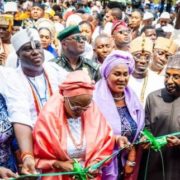Africa’s Digital Infrastructure Enters Hypergrowth Phase
Africa’s data centre industry is on the verge of an unprecedented expansion, with capacity projected to triple by 2030 as the continent’s appetite for digital services continues to rise.
RELATED: Telcos in MEA partnering global hyperscalers to accelerate cloud adoption, says GlobalData
Experts made this projection at the Hyperscalers Convergence Africa 2025 conference held in Lagos, emphasizing that Africa’s total data centre capacity — currently estimated between 1.5 and 1.6 gigawatts — could reach 2,500 megawatts (2.5 GW) by the end of the decade.
The rapid growth is being driven by an explosion in artificial intelligence (AI), cloud computing, and fintech innovation, all of which require localized, high-performance digital infrastructure to thrive.
Industry Leaders Chart Africa’s Path to 2,500MW Capacity
During a high-level panel discussion themed “Data Centre and Cloud in Africa: The Journey to 2,500 MW,” industry experts and investors from across 15 countries shared insights on Africa’s evolving data economy and the investments required to sustain it.
Guy Zibi, Managing Partner at Xalam Analytics, noted that while Africa’s share of global data capacity remains modest, its potential is immense.
“The global AI race has redefined Africa’s opportunity map. If Africa captures even half a percent of global data centre power demand by 2030, that’s at least one gigawatt of new capacity. The question is, who will finance, regulate, and staff it?” he said.
Panel participants included Johnson Agogbua (CEO, Kasi Cloud Data Centers), Snehar Shah (CEO, IX Africa Data Centres), Roger Shutte (GM, MTN Nigeria), and Karim Amer (Head of IP Business, Nokia North, West & Central Africa).
Regional Growth Hubs and Market Leaders Emerge
South Africa continues to dominate the data centre landscape, hosting Africa’s largest and most interconnected facilities, such as Teraco Data Environments. However, Nigeria is rapidly rising as West Africa’s key hub, powered by operators like MainOne and Rack Centre, which are driving regional connectivity and cloud adoption.
Karim Amer of Nokia highlighted the growing dominance of North African economies in digital infrastructure.
“By 2030, Egypt will account for about 25% of Africa’s total data centre capacity, Morocco 15%, and Nigeria around 9%. The balance of growth will depend on energy reliability, cross-border regulation, and policy openness,” he explained.
Meanwhile, Kenya, Ghana, Ethiopia, Tanzania, and Uganda are emerging as competitive regional players focusing on sustainable energy, local partnerships, and scalable network expansion.
Infrastructure, Energy, and Policy — The Next Frontiers
Experts at the conference identified three critical enablers for Africa’s next phase of growth: energy reliability, policy harmonization, and talent development.
Snehar Shah, CEO of IX Africa Data Centres, stressed the importance of regional cooperation.
“We need East African data-sharing frameworks so neighbouring countries can use Kenya’s infrastructure. Otherwise, capacity will remain isolated while demand elsewhere grows.”
Roger Shutte of MTN Nigeria highlighted the pace of innovation:
“The learning journey has shortened since late 2022. What used to take 18 months to build now takes a single evening. The real challenge is deployment — infrastructure must keep up with innovation.”
Investments and Collaboration to Power Africa’s Digital Future
Industry leaders agreed that collaboration between governments, telcos, and cloud providers will be key to scaling infrastructure efficiently. Johnson Agogbua of Kasi Cloud Data Centers noted that partnerships and joint investments are critical to bridging the capacity gap.
The experts concluded that Africa’s digital transformation — driven by AI workloads, fintech growth, and rising cloud adoption — is outpacing infrastructure development, underscoring the urgent need for massive investments in power, fibre networks, and data storage capacity.
As the continent races toward 2030, the vision of a digitally sovereign, interconnected Africa is taking shape — one powered by homegrown innovation, sustainable energy, and bold investment.






























